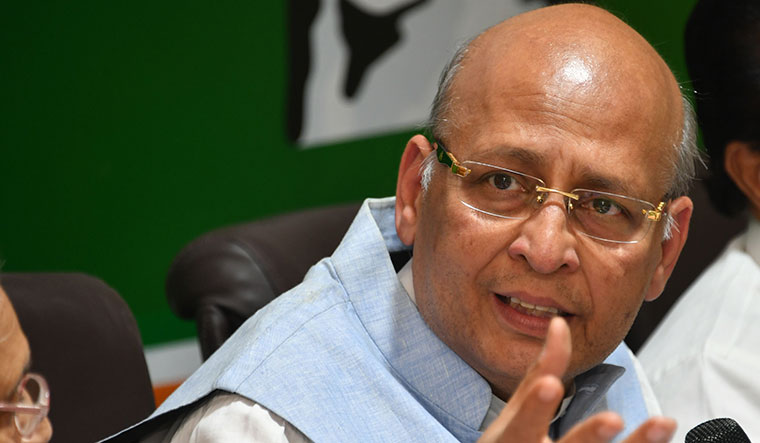Congress leader and eminent jurist Abhishek Manu Singhvi is leading the legal fight against former party president Rahul Gandhi’s disqualification. He told THE WEEK that there are many legal infirmities in the court order. He is confident that a stay on the conviction will be procured soon. Excerpts:
Q/ How do you legally assess the verdict by the Surat district court?
A/ The very basis of the complaint on which the verdict has come is questionable. The complainant’s grievance is that Rahul Gandhi insulted a particular community. What did Rahul Gandhi say? He said that I am surprised that all these persons, and he cited specific instances, who are thieves have the same surname. He did not say that all the people who have this surname are thieves. Now, the complaint would not have been maintainable had it not been for the grievance that an entire community had been insulted. The community allegation was necessary because none of the three individuals who Rahul Gandhi had mentioned in his speech had filed a complaint. So if Rahul Gandhi did not say that all the people who have this surname are thieves, the claim that a community has been insulted does not hold water.
Q/ How do you view the maximum punishment of two years that was handed out?
A/ Convictions in criminal defamation cases are rare. And in cases where convictions happen, the sentence is usually of, say, a maximum of three months. In very extreme cases, six months. And it is indeed rare, and it normally never happens, that in a case of criminal defamation, a first-time offender is given the maximum punishment of two years. A lesser judgment, say, of one year, 11 months and 29 days would not have resulted in disqualification.
Q/ The BJP says the disqualification is the result of a judicial process.
A/ The sequence of events leading up to the court verdict is intriguing. To begin with, there is the issue of jurisdiction. The statement was made in Kolar, Karnataka, but a complaint is filed in Surat.
The complaint is filed in April 2019. In 2022, when the court rejects an application by the complainant seeking summons to Rahul Gandhi who has already appeared there, the complainant rushes to the High Court and gets a stay on his own complaint. After 11 months, in February this year, the complainant seeks a vacation of the stay. A different judge hears the matter in the district court. And in a month’s time, the court pronounces its verdict.
Q/ Questions have been raised about why an appeal has not yet been made in a higher court. The BJP says the Congress acted much more promptly in the case of Pawan Khera.
A/ It is an unbelievable thing to say that Rahul Gandhi is deliberately being kept disqualified. Pawan Khera’s case was different. He was arrested by the Assam Police at the Delhi airport. I was myself arguing in the Supreme Court when the matter came up. With regard to the order of the magistrate’s court in Surat, how can we go straight to the Supreme Court? The apex court will send us right back to the sessions court. Also, an appeal takes time to file. It is a 170-page judgment. It is in Gujarati. It had to be translated and studied. The conviction is sought to be stayed. An appeal will be filed shortly.
Q/ The Congress has criticised the disqualification. Is disqualification not automatic as per law?
A/ The point is not that the Election Commission is not entitled to give disqualification. Of course, it can. The point being made was a nuanced one. It was about whether, taking into account values of good governance, decency, reasonableness, the aggrieved party has to be given four to five days to file an appeal. The law does not say that the notification should be made within 24 hours or 48 hours of the court order.
A few months ago, in the case of a politician from Uttar Pradesh, when a byelection was announced post disqualification without waiting for the individual to exhaust his legal remedies, the Supreme Court deferred the bypoll and even said, ‘look with what alacrity have you proceeded’.
Also, according to Article 103 of the Constitution, it is the president who issues the order of disqualification of a sitting legislator, and that before issuing the order, the president must get a recommendation of the Election Commission. The EC has stated before the Supreme Court that this does not apply in matters where a court has convicted the legislator and the disqualification is automatic.
Q/ Are you confident that a stay on conviction will result in reinstatement of Rahul Gandhi’s Lok Sabha membership?
A/ The basis and the foundation of the disqualification is the conviction. If the conviction is stayed by the appellate court, the basis for the disqualification does not exist anymore. The building cannot stand without its foundation. It is another matter if the Election Commission delays the reinstatement. Going by common sense, the reinstatement should be automatic upon stay on conviction.
Q/ Any concerns that Rahul Gandhi would not be able to contest the next Lok Sabha elections?
A/ Not at all. We are confident that we will get a stay on the conviction very soon. There are many legal infirmities in the district court’s order and we have a very strong case.


